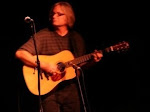
My Theme and Variations lesson is posted at Acoustic Guitar's website, completely with recording. The first time I've ever recorded any Mozart--though it is only two measures.
Music, Cycling, Guitars, Books, Bikes, Guitarists

Last night I saw the new indie movie Once, which I would highly recommend to anyone, really, but mostly to anyone who has ever been frustrated with the way music and musicians are treated on the big and small screens. This is the most realistic treatment of musicians and the way they work that I've ever seen. There's no overblown Rocky approach, songs are allowed to be performed, usually on the street, in rehearsal, or as they are being written, in their entirety. This is almost unheard of on film or documentaries (other than concert films), since filmmakers seem to think that allowing an entire piece of music to be heard would put a film audience to sleep.
The movie stars Glen Hansard, lead singer of the Irish band, the Frames, and Marketa Irglova, both musicians, and until this movie, nonactors. Hansard was originally signed up as songwriter and consultant but when the intended star (Cillian Murphy) became unavailable, he was recruited. His performances with Irglova are stunning and while it ostensibly centers on their budding romance and musical collaboration, by the end you realize that the film portrays the sort of fleeting, temporary (thus the title, Once) musical interactions that happen all the time in the music world, and that are what keep musicians doing what they do. It doesn't hurt that Hansard's songs are catchy and literate (and that his performances are powerful and heartfelt) and that Irglova is one of the most charming screen presences I've seen in awhile. Definitely a movie not to be missed.
A great tune by a great band. I like to think of the title as "One Hour in Hungry." I'm posting this here partly so I can learn it
Here's a rockin' tune from the StringNation festival with Brittany Haas tearing up "Duck River." How does she do that?

